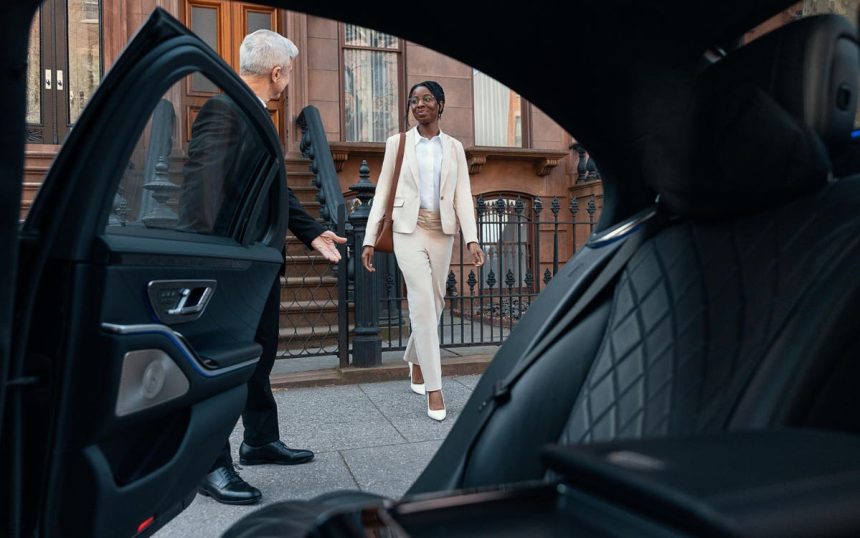Earlier this month, I posted an interview about rideshare company Alto. CEO and co-founder Will Coleman explained to me Alto rivals competitors like Lyft and Uber in a very Apple-like way: by focusing on a premium user experience. Alto riders are afforded such luxuries as bottles of water, umbrellas, and more while traveling in nicer vehicles. Coleman said in part the company’s strategy is to woo people who are willing to pay more (and wait longer) for a decidedly higher-end experience than what is found in an average ride with Lyft or Uber.
But who competes with Alto? Backlane, that’s who.
Blacklane, with apps available on iOS and Android, shares more or less the same product strategy as Alto: try to commandeer the upper echelon of the rideshare market. Blacklane offers city-to-city rides, chauffeur hailing, airport transfers, and even limousine service. On its website, the company boasts its safety-conscious mindset, private travel, and environmental sustainability by touting “all ride emissions are offset” through its industry-first global carbon offset program.
For CEO and co-founder Jens Wohltorf, the impetus for building Blacklane mirrors much of Coleman’s experiences with Alto. Like Coleman, Wohltorf was dissatisfied with transportation over a decade ago as he spent a lot of time traveling to and fro for business. More pointedly, Wohltorf and his co-founders sought to fill the “glaring gap” in the market for reliable ground transportation. In short, Blacklane’s passions lie in democratizing chauffeur services for everyone.
“Blacklane’s purpose is to create true peace of mind today for a better tomorrow,” Wohltorf said to me of his company’s raison d’être in an email interview conducted earlier this week. “That is what we focus on relentlessly and which ultimately helped us to become what we are today [in the market]—the leading global chauffeur service provider.”
My conversation with Wohltorf coincided with his company’s announcement today that it completed Series F funding, in addition to what it described in a press release as a “significant million euro sum” partnership with car rental company Sixt. The deal will see Blacklane’s services available in the Sixt app beginning next year; it will launch in the United States and other international markets. Blacklane touts this as enabling “even broader choice of vehicles and services” to customers.
Wholtorf called the newly-minted partnership with Sixt a “testament to the soundness of [Blacklane’s] business model and growth prospects.”
Technologically speaking, Wholtorf told me tech is instrumental to facilitating Blacklane’s guiding principle of care. Care, he said, is a value that runs through the company’s DNA, extending not only to riders, employees, and chauffeurs, but to the tech stack as well. Wholtorf explained technology is “at the forefront of our minds every step of the way,” adding “it’s the driving force behind the new features we continuously develop to enhance the Blacklane experience.” Blacklane strives to have utmost attention to detail in all aspects of the user experience, with Wholtorf telling me the team tries to ensure “every interaction with Blacklane is a seamless and delightful one.” Likewise on the backend, Blacklane operates atop an “intricate web” of systems that, Wholtorf said, exudes care with regards to efficiency and sustainability. Moreover, it’s important Blacklane provides what he called “sustainable income streams” for chauffeurs so they can thrive in their work knowing they’re earning livable wages as they help others get around easier.
As with Alto, Lyft, and the rest, Blacklane is notable from a disability perspective simply because it’s on-demand transport. For people who have mobility and/or visual conditions that make driving infeasible or impossible, the sheer fact one can tap a few buttons and summon a car, any time they need one, is nothing short of revolutionary in an accessibility context. It’s technology—and smartphones’ ubiquity—that has allowed disabled people to (mostly) move with freedom heretofore unthinkable in human history. It’s not an ideal system, but the salient point is merely that rideshare services are just as much about accessibility as they are about convenience. That cannot be overstated.
When asked about technology’s part in transforming transport, Wholtorf attributed tech’s ever-burgeoning role to an evolving concept of car ownership. Fewer people than ever own a car nowadays, he said, which gives rise to companies like Blacklane. Moreover, the advent of rideshare services adds an interesting component to society’s mixture of mobility.
Wholtorf also pointed to connectivity, saying he believes the internet of things concept will eventually grow into something where devices will “one day be linking vehicles, infrastructures, and even our guests, thereby creating a web of interconnected mobility.”
Wholtorf said Blacklane aims to have 15% of its fleet be electric vehicles by the end of the year; that number is hoped to reach 50% by 2025.
Looking towards the future, Wholtorf reiterated the notion that today’s investment news by the company is affirmation of the company’s business model and institutional belief system. He’s very proud of the myriad efforts Blacklane is making to make premium, on-demand transport more accessible, sustainable, and diverse. In Dubai, for example, Wholtorf was keen to point out 50% of Blacklane drivers are women, saying they want to make the industry more inclusive of women.
“After more than ten years, it’s still very rewarding for me personally to see how we grow and develop while going after what is important—reliable, sustainable, and reasonably-priced quality transportation delivered by our amazing chauffeurs,” Wholtorf said of his work. “Looking ahead, I’m proud of the vision the Blacklane team shares. We are driven by a shared purpose that guides our collective efforts.”
Read the full article here









